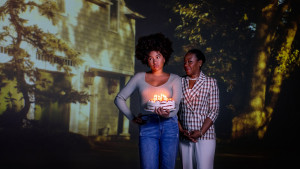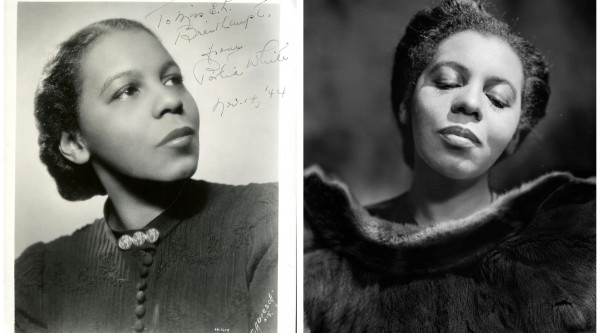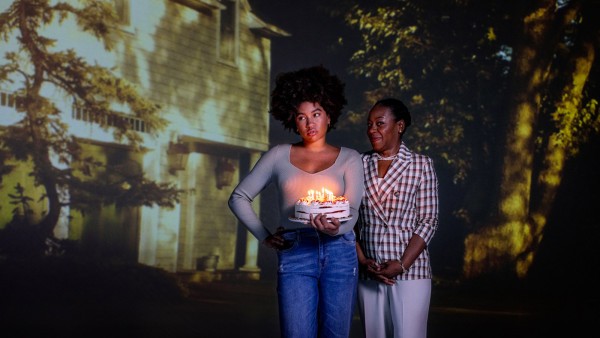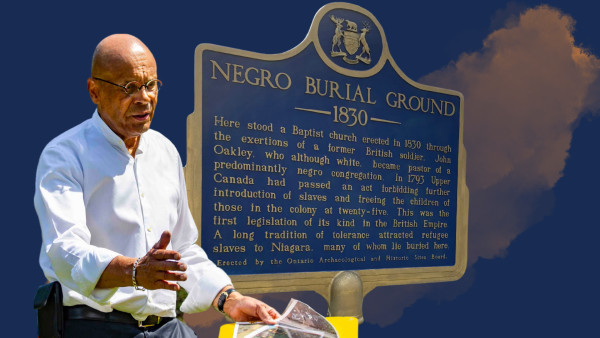Perhaps the new, large-scale, all-Black opera ensemble will pique your curiosity. Of The Sea is brought to us by a collaboration between Obsidian Theatre and Tapestry Opera, with the libretto by playwright Kanika Ambrose (Our Place / Anansi and the Great Light, Curtis School of Music), music composed by Métis and French-Canadian musician Ian Cusson (Fantasma, Canadian Opera Company), music direction by Chinese-Canadian conductor Jennifer Tung (Gould's Wall), and the piece is directed by the award-winning Black cultural leader, director, and actor Philip Akin (Pass Over / Gould's Wall)—a fantastic and illustriously talented Black and diverse ensemble.
Canada is home to astounding Black opera singers who have paved the way for many and continue to leave legacies to be proud of. Dating back to the first Black Canadian contralto concert singer to achieve international fame, Portia White, who was from Nova Scotia. Award-winning Canadian soprano Measha Brueggergosman has been delivering her beautiful range for many years and is a Canadian treasure. Jamaican-born Canadian Othalie Graham is a soprano who has left an indelible mark during her career.
Even Miami native Audrey Dubois Harris, Aretha Franklin’s favourite soprano, has settled in Montreal, occasionally performing when the opportunity arises. And, of course, many others are sharing their talents. However, it’s not a long, undulating list. This is a medium where Black representation and stories are historically underrepresented. So it will be exciting to see this undertaking by Ambrose, with an entire cast of Blackness, bring us an art form that isn’t typically within reach.
Of The Sea is a story steeped in our Black history with a mythological flare. The premise is about ‘Maduka, his daughter Binyelum, and fellow Africans thrown overboard during the Middle Passage who now populate mythical underwater kingdoms that span the ocean floor.’ If you remember, Killmonger spoke about the same sentiment in Marvel's Black Panther. Imagine the statement being brought to life visually.
{https://youtu.be/QX07BqC1gd4}
But Ambrose was ahead of her time, and she’s been cultivating her creative underworld since 2018. “So, I wrote this before Black Panther came out (laughs). I started writing it in August 2018. I wasn't a librettist at the time. Tapestry Opera. One of the producers had a program called LibLab, the Composer-Librettist Laboratory. It's ten days, four composers and four librettists. At that time, I was a playwright, and we got together to create four new original works.”
“Of The Sea was our last pairing. The prompt was to create a virtual reality opera. Ian (the composer) and I went to an arcade because neither of us had played virtual reality. So, we played the easiest, beginner-level game. We were either floating or falling in the air or the sea, and we weren't sure where we were,” says Ambrose. “So, I said this feeling of floating or falling would be amazing to create a virtual reality opera where the characters are doing one of those things. Ian is Indigenous, so I [wondered] what could we pull from our cultural mythology or folklore that related to stories of floating or falling.”
“I was the libretto, so I was creating the story. I pulled from my origins, and I'd read a lot of Caribbean folklore as a child. My mind drew me to African ancestors lost to the Middle Passage and what that means for that amount of bodies; hundreds of thousands, possibly millions. The number is not known. What does it mean for that amount of bodies to exist at the bottom of the Atlantic Ocean? And how does that water change having had that amount of human matter, a Black human matter makeup? What is that ocean? So that was the original impetus for my thinking about the story,” says Ambrose.
Listening to Ambrose recount her inspiration for the libretto is educational. She digs deep to ensure everything presented is meticulously researched and factual. For example, her use of a chorus of 54 symbolizes the actual number of enslaved bodies, women and children, who were thrown overboard the Zong ship because of the crew’s incompetence in miscalculating food and water. And there are many more instances we can most likely learn from, seeing that Black history plays such a pivotal piece in the production.
Being an opera lover since her grade ten vocal music class, Ambrose couldn’t see this piece going any other way. As a playwright, not even a play would suffice for what she had creatively unfolded in her mind. “I had a deep understanding of what opera was and what kind of stories I thought worked best for opera and for me. All kinds of people who do all kinds of opera. You could do an opera about me and you here having this interview and have it be very naturalistic and very like today.”
“But I think I was most attracted to large-scale stories of epic proportions. So I knew the scale of the mythology I was trying to tell, the number of people I wanted in it, and the depth of the emotion. I felt this would be the best medium to showcase it because it's not just the text. The music and the orchestra heighten it. We have a pretty large orchestra. There are sixteen people in the cast. Sixteen people on stage is quite large. So I felt the type of story I was telling needed that magnitude,” says Ambrose.
There are many people excited about this opera, as they should be. Nevertheless, we should also note that while this is not the first Black opera presented in Canada, there are still not that many that have been given a platform to represent on main stages. Recently we’ve had La Flambeau by Haitian librettist, and playwright Faubert Bolivar takes place in Montreal. However, keep your ear to the ground for a few more iterations of Black opera coming our way via the reimagining of Scott Joplin’s Treemonisha and Aportia Chryptych: A Black Opera For Portia White at the Canadian Opera Company Theatre by Canadian director and librettist HAUI in 2024.
With that in mind, I wondered how we get Black patrons in the seats to support a creative genre that many do not relate to. Ambrose had a few words to share about the matter. “I've been thinking about that a lot. I think that it's going to take time. But first I would say it's not what you expect. I would encourage them to let go of the expectation of whatever the expectation is the opera's going to be. Some people have said, ‘Oh, you're an opera writer. Do you speak Italian?’ I respond, no, the opera is in English. They ask, ‘How do you write an opera in English?’ The same way I write anything else! (laughs)
“And then the other part of it is it's going be a celebration. There’s opening night and Black celebration night on a Tuesday. There will be food, drinks, chatting, music, spoken word, and other events around it. The opera is 90 minutes. It's short. And you get to engage with other Black folks. So I would look at it as an actual fun experience. And if you're curious about opera or have heard some stuff, this is a great first opera to wet your toes with.”
Of The Sea runs from March 25 to April 1, with performances Tuesdays to Saturdays at the Bluma Appel Theatre
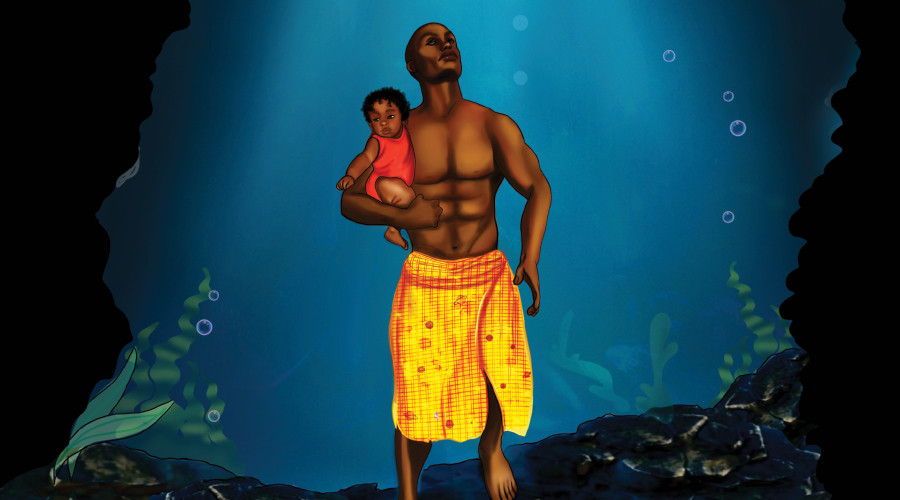
 By
By 




